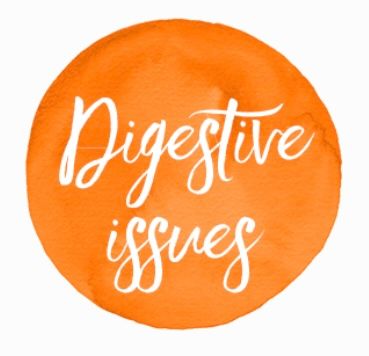
Digestive Issues
In those dim, and increasingly distant days, when you felt bloated during your period, your stomach and intestines emptied at a slower pace in the latter part of your menstrual cycle - and this same digestive sluggishness can happen during menopause. “Just Can’t Keep it in” Okay, we don’t think Cat Stevens was singing about digestive problems, but they can certainly happen during menopause.
WHY NOW?
Oestrogen helps keep the stress hormone, cortisol, in check. But when oestrogen runs low, cortisol increases, raising both blood pressure and blood sugars and slowing down digestion. The result: bloating, indigestion, acid reflux, painful abdominal cramps, constipation, diarrhoea, weight gain, flatulence and nausea. Sorry, the other bad news is that existing conditions such as Irritable Bowel Syndrome (IBS) can be exacerbated by the menopause.
BE PROACTIVE
The best way to relieve digestion problems in menopause
What to eat to help with digestive issues
WHAT TO EAT
Double whammy foods Phytoestrogens, (plant compounds), mimic the effects of oestrogen, help to balance hormones and can help with digestive issues, are sound in:
Legumes: (chick peas, lentils, peas), peanuts, alfalfa and wholemeal rice.
Nuts: almonds in particular work menopausal wonders, cashews and peanuts.
Seeds: milled linseed, sesame, sunflower, pumpkin.
Whole grains, rye, barley and oats, whole wheat, granola, bran and muesli.
Soya products: milk, yogurts, mince, flour, beans, fermented Miso.
Fibre prevents constipation. Eat more: whole grains, broccoli, spinach, apples, cauliflower and oats. Omega-3 is a star player in digestion, with anti-inflammatory powers they help promote healthy stomach bacteria and keep cell membranes healthy. Eat more: walnuts, chia and linseeds, egg yolks and SMASH - salmon, mackerel, anchovies, sardines and herring.
Have more oats Probiotic supplements and food are big business, but the BBC’s Trust Me I’m a Doctor programme found a lack of evidence that they have much impact on digestive issues. Instead, they recommended the humble low GI oat - and its fibre content – as a better option to support digestion. Pass the porridge!
Spice up your digestion Try Turmeric, an anti-inflammatory, which can sooth the stomach and protect it from acid overload. Add it to cooking, smoothies and salad dressings, (where it’ll give digestive benefits, gorgeous colour and a yummy flavour). Fennel, caraway, cardamom and star anise seeds can also help to deal with digestive issues. Fennel is a bit of an unsung digestive hero; easing wind, bloating and stomach pains. Add crushed seeds to sauces, or make a tea by adding 2 teaspoons of crushed fennel seeds to boiling water.
Liquorice cures allsorts But not everything! Liquorice is good for heartburn and acid reflux. Chew liquorice root – remember it from playground days? (or is that just us!). It can be taken as a supplement, or as a tea made from powder form. The recommended dose is no more than 5 ounces per day, which is about 3 pieces of raw liquorice root or 2-3 cups of liquorice herbal tea.
Chew and Sit Eating on the go uses energy for walking that should be used for digestion, so sit down, chew and enjoy. On the subject of chewing, avoid gum. Hormone fluctuations may also affect the working of the oesophagus causing reflux, as air moves in the wrong direction, resulting in noisy burps! Stay Regular Hormone fluctuations can cause constipation, as well as some of the menopause supplements you might be taking. Hard stools, straining or passing less than three stools in a week may suggest constipation. Up your fibre intake by eating fruit, vegetables and more wholegrains.
Probiotics Probiotics are friendly bacteria that help restore the natural balance of bacteria in your gut. Lactobacillus is good for health gut but do make sure you buy it from a reputable health food supplier to ensure you’re getting the best bacteria content. These friendly bacteria are also found in fermented products - natural yoghurt, miso (fermented soybean paste), sourdough bread and soy drinks. Try sauerkraut, or the new on-trend, gut-friendly fermented foods kimchi, kombucha and yucatan which could help with menopause symptoms such as bloating, low energy, loss of libido and irritable bowel syndrome. Why not make your own,
‘Time for tea’ to help digestive problems Caffeine-free herbal teas such as peppermint, ginger and camomile help with nausea and soothe your digestive system. Calming fennel tea has antiseptic properties. Where possible use fresh products to make these teas. Chop coarsely, (they’ll be even healthier if you add chopped fresh turmeric) add boiling water and strain. Tasty and full of good stuff. Drink several times a day for maximum benefit.
Make it better with bitters Bitters are made from seeds, roots and a mix of botanicals, tasting better than they sound! Traditionally used for stomach problems, just add a few drops of a bitter like Angostura to a glass of water to help with flatulence, indigestion and a host of other digestive issues. The bitter taste stimulates digestive juices and sends messages to the brain to get the digestive system working. If you can’t buy bitters locally, look online, flavours to help include; orange, black walnut and plum. Add bitters to tonic water for an almost alcohol-free drink. Usually sold in small bottles, a little goes a long way.
Water Drink lots of it, straight from the tap and in herbal teas. Water dilutes the acids responsible for indigestion and helps softens stools. Lack of moisture can lead to pains and constipation.
What to avoid to help with digestive issues
The wheat in bread and pasta can take its toll on digestion, causing bloating, cramps and flatulence, so eat less or go the whole way and cut it out altogether. If your condition improves there’s some great gluten free alternatives in most supermarkets and health food stores.
Alcohol, hydrogenated fats, refined carbohydrates, and sugar are on the avoid list due to the cortisol havoc they bring. Cortisol increases gastric acid production leading to acid reflux and can also cause problems with digestion.
Caffeine may jump start the bowel into action causing cramps and diarrhoea. If you cut out coffee, you may see an improvement in your symptoms.
Lifestyle & wellbeing to help with digestive issues
Exercise Can help to keep you regular. Alongside a healthy diet It can help to keep your weight in check, so putting less stress on the digestive system.
Stay calm and try to manage stress When you’re stressed you may eat too much, eat too quickly or opt for some of those comforting high carb, refined foods that trigger your digestive problems. Taking steps to manage stress; supplements, exercise, yoga, mindfulness or even HRT, may lower pesky cortisol levels and you may notice an improvement in your menopausal digestive problems. Read our blog 6 Things you can do to relieve stress in menopause.
Identify your triggers If it’s a persistent problem keep a log, no pun intended, of what you’ve eaten, when you’ve eaten and the stress levels you were experiencing before your specific digestive issue struck.
Manage your movements A little tip we learnt from Women's Health Physiotherapist Christien Bird, to help ease our bowel movements, prevent straining, or prolapse, is to prop our feet up so that knees are raised higher than hips. The physiology of our body is still set up to squat behind trees. So, either use a small stool (sorry about the pun!), such as a child's potty training stool, a stack of loo rolls, or, just go glamorous and wear your stiletto’s! There's also the Squatty Potty that's been designed especially to help you out.
Is there an App for that? FODMAP APP FOR PEOPLE WITH IRRITABLE BOWEL SYNDROME FoodMaestro has collaborated with King’s College London and Guy’s and St Thomas’ NHS Foundation Trust to create a new app to help people with IBS whose Registered Dietitian has recommended that they follow a low FODMAP* diet . A key feature of the new app is the ability to quickly and easily find suitable foods to eat from over 30,000 ingredients and 100,000 products in leading UK supermarkets. The FODMAP by FM app is free to download on IOS and android for 14 days, with a £3.99 annual subscription thereafter.
Supplements worth trying for digestive issues
These supplements may help with production of oestrogen, which could improve efficiency of your gastrointestinal function.
Black cohosh
Dong Quai*
Evening Primrose oil
Liquorice root (though not if you have high blood pressure)
Red Clover
Siberian Ginseng
Wild Yam
Omega-3 if you’re not getting it from your diet (rich in DHAs, check the label)
Natural supplements can have side effects, impact on any medications you are taking and shouldn’t be taken long term. *Dong quai may affect blood clotting. Discuss with your doctor, especially if you have any form of surgery coming up.
Alternative help for digestive issues
Acupuncture & Traditional Chinese medicine
Traditional Chinese medicine and/or acupuncture treats the person as a whole rather than by specific symptom. Menopause issues are seen as a sign of imbalance in yin and yang. Digestive problems associated with menopause will be looked at as part of your kidney function. When the kidneys are low in yin and yang, the body either lacks fluid, becoming dry and overheated or may have too much fluid.
If you have digestive issues you may find that you need to talk to a Registered Nutritional Therapist. They will assess your diet and develop a personal nutrition programme to provide a combination of expert nutritional advice with coaching support to improve symptoms. Registered Nutritional Therapist and author, Jackie Lynch from WellWellWell, specialises in menopause nutrition.
When to see your doctor about digestive issues
If you are suffering from constipation, consider consulting a Women’s Health Physio. Too much straining could result in further problems such as prolapse. Women’s Health Physio Christien Bird, runs an online Menopause MOT service specifically developed for menopausal women.
For further help Pelvic Health Campaigners #PelvicRoar provide helpful resources on their website. Talk to your doctor about your options if lifestyle and diet changes don’t do the trick.
And then there’s always HRT…
HRT addresses the hormone imbalance, dealing with the anxiety and stress, that impact negatively on the digestive system. Our usual caveat, there are pros and cons to taking HRT. We don’t take a view. It’s for you to decide whether it’s for you or not.
And we can help
Your Fbl Team x
© Copyright. All rights reserved.
